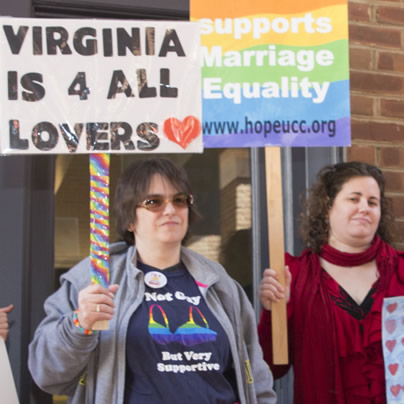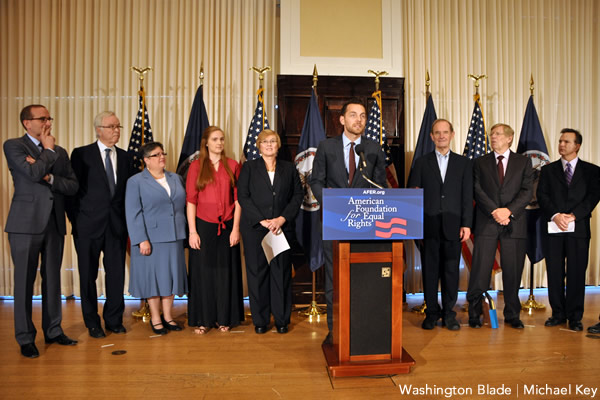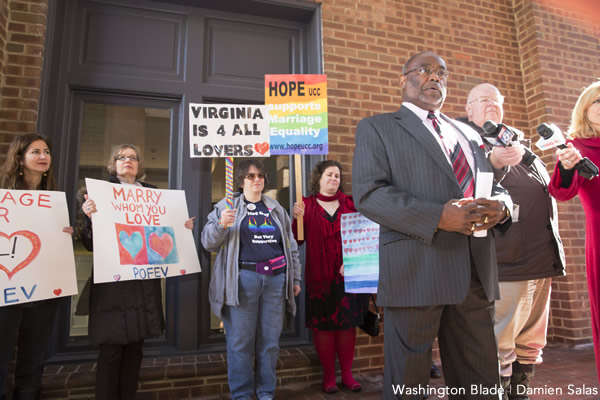National
Plaintiffs in Virginia marriage lawsuit: We were Goliath
Tony London’s brother died hours before judge issued ruling


From left, Human Rights Campaign President Chad Griffin, lawyer Tom Shuttleworth, Carol Schall, Emily, Mary Townley, Adam Umhoefer, lawyers David Boies and Ted Olson, and plaintiff Tim Bostic (Washington Blade photo by Michael Key)
The two men earlier in the day found out that London’s brother had passed away.
“We were at home in the den waiting to hear about plans so that we could make our trip to Texas,” Bostic told the Washington Blade on Friday, noting he ignored his cell phone when his lawyers called it to let him and London know about Allen’s ruling. “The home phone rang and it was the same number and I was like, that’s really odd. So I picked it up and that was them letting us know the decision had come down.”
Bostic and London – who challenged Virginia’s same-sex marriage ban alongside Carol Schall and Mary Townley of Chesterfield – were among the more than 400 people who gathered at Decorum Furniture in Norfolk on Friday to celebrate Allen’s ruling.
“We are so proud to be proud Virginians,” said Hampton Roads Pride President Laurel Quarberg.
Lieutenant Gov. Ralph Northam also attended the event that Blaine Stewart, an anchor on WKTR, a Norfolk television station, emceed.
“We shouldn’t as a government be telling people who they should and shouldn’t love,” Northam told the Blade. “In 2014 one should be able to love and marry who they want. They should be able to be in the workplace without discrimination and they should be able to raise children as they so choose. It’s a big day for Virginia.”
Same-sex marriage supporters also celebrated Allen’s ruling at a number of gatherings that had been previously scheduled across the state to coincide with Valentine’s Day.

Alexandria Mayor William D. Euille joined a rally for marriage equality at the Alexandria City Courthouse on Valentine’s Day. Couples proceeded from the rally into the courthouse to request a marriage license, but were denied due to state law. The rally in Alexandria was one of several held throughout the state. (Washington Blade photo by Damien Salas)
More than a dozen people unfurled a rainbow banner outside the Virginia Beach Circuit Court before two couples sought to apply for marriage licenses. They included Teresa C. Phillips and Joyce Ann Davis of Chesapeake, who married last October in Delaware on their 33rd anniversary.
Phillips, who spent more than two decades in the U.S. Army, told the Blade as she and Davis walked to the courthouse that the Pentagon gave her spouse an identification card allowing her to receive benefits after they tied the knot in Delaware. Phillips said she and Davis were “elated” to hear Allen’s ruling, but acknowledged “we still have a long way to go” before she and other gays and lesbians can marry in the commonwealth.
“I want to get married in Virginia,” Phillips told the Blade.
Attorney General Mark Herring, who announced last month he would not defend the marriage amendment in court, described Allen’s 41-page decision as “a victory for the Constitution and for treating everyone equally under the law.” Gov. Terry McAuliffe, Equality Virginia Executive Director James Parrish and gay state Sen. Adam Ebbin (D-Alexandria) are among those also applauded the decision.
The Family Foundation of Virginia, the National Organization for Marriage, House Speaker Bill Howell (R-Stafford County) and state Del. Bob Marshall (R-Prince William County) and others criticized the ruling – and Herring in particular for not defending the marriage amendment that Virginia voters in 2006 approved by a 57-43 percent margin.
“She opened her order before the word other with a rather poetic quote,” former Attorney General Ken Cuccinelli told Bruce DePuyt of News Channel 8 on Friday, referring to Allen’s decision to begin her ruling with a quote from Mildred Loving on the 40th anniversary of the landmark U.S. Supreme Court ruling that struck down Virginia’s interracial marriage ban. “It rather undermined her objectivity. She clearly had a view coming in. We expect judges to look at these things more objectively.”
Schall and Townley, whose daughter Emily just turned 16, have also faced questions from same-sex marriage opponents about whether gay couples should raise children.
“Now we know that most of America doesn’t agree with the view of those few,” London told the Blade. “Those few still have the right to make any kind of statement that they want to however they want to as long as its within the boundaries of the law. We’re perfectly happy to see them come up there because we know there is no argument, there’s just no argument at all.”
Bostic added he felt sorry for the lawyers who were defending the marriage amendment during the Feb. 4 oral arguments in their case.
Allen stayed her ruling, pending the outcome of an appeal.
“It felt like David and Goliath… except this time we were Goliath,” he said. “We were expecting less support and more opposition from the get go. I do believe in Virginians, but it was just this idea all of a sudden there were more people on our side than we were hearing negative. It’s a good feeling.”
As Bostic and London spoke with this reporter at Decorum Furniture in Norfolk, a woman whose girlfriend of 16 years passed away two weeks ago thanked the men for filing their lawsuit against the marriage amendment.
“What you guys did was great,” she said.
“That is why we’re doing this,” London told the Blade after the woman spoke with him and Bostic. “16 years and they have nothing left. They have no rights in this state at all. Whatever they built together is gone.”
National
Same-sex couples vulnerable to adverse effects of climate change
Williams Institute report based on Census, federal agencies

A new report by the Williams Institute at the UCLA School of Law finds that same-sex couples are at greater risk of experiencing the adverse effects of climate change compared to different-sex couples.
LGBTQ people in same-sex couple households disproportionately live in coastal areas and cities and areas with poorer infrastructure and less access to resources, making them more vulnerable to climate hazards.
Using U.S. Census data and climate risk assessment data from NASA and the Federal Emergency Management Agency, researchers conducted a geographic analysis to assess the climate risk impacting same-sex couples. NASA’s risk assessment focuses on changes to meteorological patterns, infrastructure and built environment, and the presence of at-risk populations. FEMA’s assessment focuses on changes in the occurrence of severe weather events, accounting for at-risk populations, the availability of services, and access to resources.
Results show counties with a higher proportion of same-sex couples are, on average, at increased risk from environmental, infrastructure, and social vulnerabilities due to climate change.
“Given the disparate impact of climate change on LGBTQ populations, climate change policies, including disaster preparedness, response, and recovery plans, must address the specific needs and vulnerabilities facing LGBTQ people,” said study co-author Ari Shaw, senior fellow and director of international programs at the Williams Institute. “Policies should focus on mitigating discriminatory housing and urban development practices, making shelters safe spaces for LGBT people, and ensuring that relief aid reaches displaced LGBTQ individuals and families.”
“Factors underlying the geographic vulnerability are crucial to understanding why same-sex couples are threatened by climate change and whether the findings in our study apply to the broader LGBTQ population,” said study co-author Lindsay Mahowald, research data analyst at the Williams Institute. “More research is needed to examine how disparities in housing, employment, and health care among LGBT people compound the geographic vulnerabilities to climate change.”
Read the report
Federal Government
Lambda Legal praises Biden-Harris administration’s finalized Title IX regulations
New rules to take effect Aug. 1

The Biden-Harris administration’s revised Title IX policy “protects LGBTQ+ students from discrimination and other abuse,” Lambda Legal said in a statement praising the U.S. Department of Education’s issuance of the final rule on Friday.
Slated to take effect on Aug. 1, the new regulations constitute an expansion of the 1972 Title IX civil rights law, which prohibits sex-based discrimination in education programs that receive federal funding.
Pursuant to the U.S. Supreme Court’s ruling in the landmark 2020 Bostock v. Clayton County case, the department’s revised policy clarifies that discrimination on the basis of sexual orientation and gender identity constitutes sex-based discrimination as defined under the law.
“These regulations make it crystal clear that everyone can access schools that are safe, welcoming and that respect their rights,” Education Secretary Miguel Cardona said during a call with reporters on Thursday.
While the new rule does not provide guidance on whether schools must allow transgender students to play on sports teams corresponding with their gender identity to comply with Title IX, the question is addressed in a separate rule proposed by the agency in April.
The administration’s new policy also reverses some Trump-era Title IX rules governing how schools must respond to reports of sexual harassment and sexual assault, which were widely seen as imbalanced in favor of the accused.
Jennifer Klein, the director of the White House Gender Policy Council, said during Thursday’s call that the department sought to strike a balance with respect to these issues, “reaffirming our longstanding commitment to fundamental fairness.”
“We applaud the Biden administration’s action to rescind the legally unsound, cruel, and dangerous sexual harassment and assault rule of the previous administration,” Lambda Legal Nonbinary and Transgender Rights Project Director Sasha Buchert said in the group’s statement on Friday.
“Today’s rule instead appropriately underscores that Title IX’s civil rights protections clearly cover LGBTQ+ students, as well as survivors and pregnant and parenting students across race and gender identity,” she said. “Schools must be places where students can learn and thrive free of harassment, discrimination, and other abuse.”
Michigan
Mich. Democrats spar over LGBTQ-inclusive hate crimes law
Lawmakers disagree on just what kind of statute to pass

Michigan could soon become the latest state to pass an LGBTQ-inclusive hate crime law, but the state’s Democratic lawmakers disagree on just what kind of law they should pass.
Currently, Michigan’s Ethnic Intimidation Act only offers limited protections to victims of crime motivated by their “race, color, religion, gender, or national origin.” Bills proposed by Democratic lawmakers expand the list to include “actual or perceived race, color, religion, gender, sexual orientation, gender identity or expression, ethnicity, physical or mental disability, age, national origin, or association or affiliation with any such individuals.”
Democratic Gov. Gretchen Whitmer and Attorney General Dana Nessel have both advocated for a hate crime law, but house and senate Democrats have each passed different hate crimes packages, and Nessel has blasted both as being too weak.
Under the house proposal that passed last year (House Bill 4474), a first offense would be punishable with a $2,000 fine, up to two years in prison, or both. Penalties double for a second offense, and if a gun or other dangerous weapons is involved, the maximum penalty is six years in prison and a fine of $7,500.
But that proposal stalled when it reached the senate, after far-right news outlets and Fox News reported misinformation that the bill only protected LGBTQ people and would make misgendering a trans person a crime. State Rep. Noah Arbit, the bill’s sponsor, was also made the subject of a recall effort, which ultimately failed.
Arbit submitted a new version of the bill (House Bill 5288) that added sections clarifying that misgendering a person, “intentionally or unintentionally” is not a hate crime, although the latest version (House Bill 5400) of the bill omits this language.
That bill has since stalled in a house committee, in part because the Democrats lost their house majority last November, when two Democratic representatives resigned after being elected mayors. The Democrats regained their house majority last night by winning two special elections.
Meanwhile, the senate passed a different package of hate crime bills sponsored by state Sen. Sylvia Santana (Senate Bill 600) in March that includes much lighter sentences, as well as a clause ensuring that misgendering a person is not a hate crime.
Under the senate bill, if the first offense is only a threat, it would be a misdemeanor punishable by one year in prison and up to $1,000 fine. A subsequent offense or first violent hate crime, including stalking, would be a felony that attracts double the punishment.
Multiple calls and emails from the Washington Blade to both Arbit and Santana requesting comment on the bills for this story went unanswered.
The attorney general’s office sent a statement to the Blade supporting stronger hate crime legislation.
“As a career prosecutor, [Nessel] has seen firsthand how the state’s weak Ethnic Intimidation Act (not updated since the late 1980’s) does not allow for meaningful law enforcement and court intervention before threats become violent and deadly, nor does it consider significant bases for bias. It is our hope that the legislature will pass robust, much-needed updates to this statute,” the statement says.
But Nessel, who has herself been the victim of racially motivated threats, has also blasted all of the bills presented by Democrats as not going far enough.
“Two years is nothing … Why not just give them a parking ticket?” Nessel told Bridge Michigan.
Nessel blames a bizarre alliance far-right and far-left forces that have doomed tougher laws.
“You have this confluence of forces on the far right … this insistence that the First Amendment protects this language, or that the Second Amendment protects the ability to possess firearms under almost any and all circumstances,” Nessel said. “But then you also have the far left that argues basically no one should go to jail or prison for any offense ever.”
The legislature did manage to pass an “institutional desecration” law last year that penalizes hate-motivated vandalism to churches, schools, museums, and community centers, and is LGBTQ-inclusive.
According to data from the U.S. Department of Justice, reported hate crime incidents have been skyrocketing, with attacks motivated by sexual orientation surging by 70 percent from 2020 to 2022, the last year for which data is available.
Twenty-two states, D.C., Puerto Rico, and the U.S. Virgin Islands have passed LGBTQ-inclusive hate crime laws. Another 11 states have hate crime laws that include protections for “sexual orientation” but not “gender identity.”
Michigan Democrats have advanced several key LGBTQ rights priorities since they took unified control of the legislature in 2023. A long-stalled comprehensive anti-discrimination law was passed last year, as did a conversion therapy ban. Last month the legislature updated family law to make surrogacy easier for all couples, including same-sex couples.
A bill to ban the “gay panic” defense has passed the state house and was due for a Senate committee hearing on Wednesday.
-

 District of Columbia5 days ago
District of Columbia5 days agoNew D.C. LGBTQ+ bar Crush set to open April 19
-

 District of Columbia5 days ago
District of Columbia5 days agoReenactment of first gay rights picket at White House draws interest of tourists
-

 Arizona5 days ago
Arizona5 days agoAriz. governor vetoes anti-transgender, Ten Commandments bill
-

 South America3 days ago
South America3 days agoDaniel Zamudio murderer’s parole request denied












